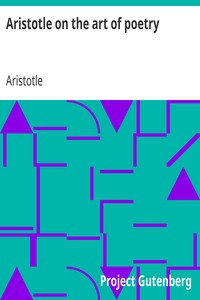Aristotle on the art of poetry by Aristotle
"On the Art of Poetry" by Aristotle is a foundational work on literary theory and criticism written in the 4th century BC. This treatise explores the principles of poetry and drama, focusing specifically on genres such as tragedy and epic, and analyzes the structure, characters, and emotional impact of these forms. Aristotle aims to define poetry's nature and purpose, discussing concepts like imitation and catharsis, thus laying the groundwork for future literary
analysis. The opening of the text presents an overview of poetry's various forms and characteristics, highlighting the differences among tragic, epic, and comic poetry. Aristotle asserts that all these forms are modes of imitation, varying in their subjects and methods. He emphasizes the importance of plot construction, character development, and the emotional engagement of the audience through eliciting pity and fear. The text argues for the significance of unity in a narrative and outlines the essentials for a well-crafted tragedy, preparing the reader for a deeper exploration of the elements that make literary works successful and impactful. (This is an automatically generated summary.)
Read or download for free
| How to read | Url | Size | |||
|---|---|---|---|---|---|
| Read now! | https://www.gutenberg.org/ebooks/6763.html.images | 149 kB | |||
| EPUB3 (E-readers incl. Send-to-Kindle) | https://www.gutenberg.org/ebooks/6763.epub3.images | 119 kB | |||
| EPUB (older E-readers) | https://www.gutenberg.org/ebooks/6763.epub.images | 121 kB | |||
| Kindle | https://www.gutenberg.org/ebooks/6763.kf8.images | 261 kB | |||
| older Kindles | https://www.gutenberg.org/ebooks/6763.kindle.images | 239 kB | |||
| Plain Text UTF-8 | https://www.gutenberg.org/ebooks/6763.txt.utf-8 | 126 kB | |||
| Download HTML (zip) | https://www.gutenberg.org/cache/epub/6763/pg6763-h.zip | 116 kB | |||
| There may be more files related to this item. | |||||
Similar Books
About this eBook
| Author | Aristotle, 385 BCE-323 BCE |
|---|---|
| Contributor | Murray, Gilbert, 1866-1957 |
| Translator | Bywater, Ingram, 1840-1914 |
| Uniform Title | Poetics. English |
| Title | Aristotle on the art of poetry |
| Note | Wikipedia page about this book: https://en.wikipedia.org/wiki/Poetics_(Aristotle) |
| Credits | Produced by Eric Eldred, and David Widger |
| Reading Level | Reading ease score: 60.6 (8th & 9th grade). Neither easy nor difficult to read. |
| Language | English |
| LoC Class | PN: Language and Literatures: Literature: General, Criticism, Collections |
| Subject | Poetry -- Early works to 1800 |
| Subject | Aesthetics -- Early works to 1800 |
| Subject | Music -- Philosophy and aesthetics |
| Category | Text |
| EBook-No. | 6763 |
| Release Date | Oct 1, 2004 |
| Most Recently Updated | Jan 24, 2013 |
| Copyright Status | Public domain in the USA. |
| Downloads | 832 downloads in the last 30 days. |
| Project Gutenberg eBooks are always free! | |

